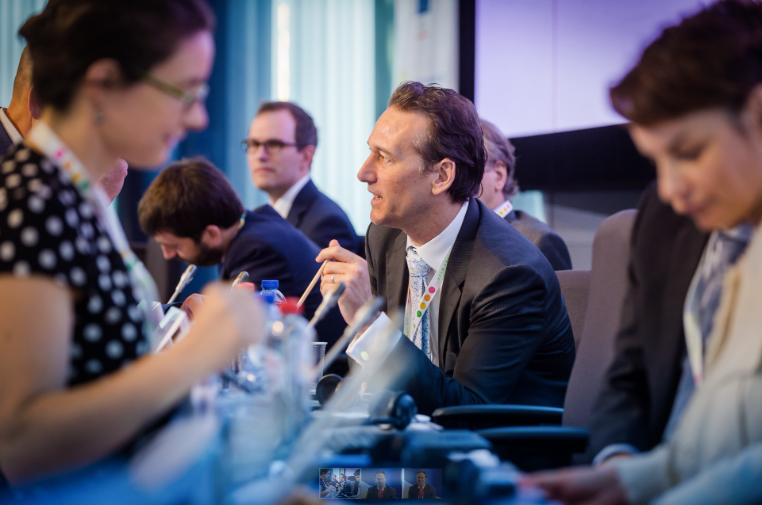
Europe’s first – and only – formal energy efficiency financial institutions group, the EEFIG, is celebrating a decade of action accelerating energy efficiency investing. Aside from not having a five-letter acronym, there is a lot to learn from the humble EEFIG, especially – in the words of the recent Versailles Statement – for a world that plans to “Urge the financial sector to support and prioritise investments in energy efficiency in accelerating efforts to reach net zero”. EEFIG’s insights and tools are very timely for the 85 countries that met at the International Energy Agency’s (IEA) ministerial energy efficiency conference earlier this month.
Launched in 2013, EEFIG was a forerunner of sustainable finance expert groups such as the HLEG, TEG and SFP, all aimed at engaging financial actors to improve EU energy and climate-related policies. With several hundred members, around 40% of whom represented – or indeed actively worked at – financial institutions, EEFIG fiercely defended its role as a “mid-level” group, providing balanced recommendations to both policymakers and market participants alike.
EEFIG worked in multiannual, multi-stakeholder, hand-selected expert groups to answer detailed questions from the European Commission and the UN Environment Programme’s Finance Initiative, producing both long-form reports and a series of much-needed tools, maps and databases for market participants. Notable EEFIG achievements include:
- EEFIG’s landmark report: Launched together with the EU’s Energy Union strategy in 2015, this was the definitive guide to energy efficiency investing in Europe, and provided the financial backbone for the ‘Energy Efficiency First Principle‘ – a pillar of the Energy Union.
- EU’s largest database of energy efficiency investments: This was designed to help financiers compare their projects with a baseline of 35,000 others across all of Europe, in both buildings and industry.
- An underwriting toolkit: EEFIG produced a set of tools designed for risk managers, underwriters, investment committees, product designers and controllers in banks and asset managers, to separate and explain energy efficiency risks in financial terms.
- A G20 task group: Catalysed by EEFIG, the G20 Energy Efficiency Finance Task Group was launched in 2015, co-chaired by France and Mexico, with 17 G20 country members, and supported by UNEP FI and the IPEEC, IEA, OECD and SEforAll. Among its landmark achievements are a set of voluntary country policy principles for energy efficiency investment, the G20 Energy Efficiency Investment Toolkit, subscribed to by more than 150 financial institutions at the Hamburg G20, and the Tokyo Declaration on energy efficiency and innovation.
- Fixing public accounting for guaranteed energy performance contracts. EEFIG saw in 2015 that energy savings delivered to local authorities by an energy performance contract were “invisible” in public accounts. This was preventing even the simplest lighting upgrades and public building retrofits. Prompted by a rush of technical work, in 2017, Eurostat published an improved guidance note for dealing with the reasonably expected savings for local authorities under contract.
- Demonstrating statistically significant positive correlation between energy efficiency and credit performance. EEFIG published an analysis based upon the largest set of European evidence – covering more than 800,000 mortgages – which shows, across multiple countries and portfolios, that more energy-efficient properties suffer lower defaults and arrears, controlling for wealth, location, income and other potential drivers.
- Helping define the EU energy efficiency investment research agenda: EEFIG’s work and members impacted and supported more than 100 Horizon and IEE projects. These included the launch of the Energy Efficient Mortgage Platform, the Investor Confidence Project, the Sustainable Energy Investment Forums (59 national roundtables in member states) and the Carbon Risk in Real Estate Monitor.
- Comprehensively answering the top ten burning questions to unlock funding for energy efficiency: In its last three years, EEFIG published multiannual studies on industrial energy efficiency, data, operationalising the Energy Efficiency First Principle, multiple benefits, stimulating consumer demand, efficiency investments in the EU budget, efficiency in the EU Taxonomy, credit risk correlations, and best-in-class financial instruments.
The binding EU final energy consumption targets agreed this spring in the recast EU Energy Efficiency Directive are historic. They require a reduction of energy consumption by 21% in just eight years – a faster rate than ever previously achieved in Europe. This will require €275bn ($301bn) of additional energy efficiency investments annually, and much of EEFIG’s work should help to unlock this in buildings, industry and SMEs.
Keep up with Energy Monitor: Subscribe to our weekly newsletterFortunately, energy efficiency technologies are truly amazing: a 4W LED replaces a 50W halogen lamp with the same quality light using 96% less energy; variable frequency drives save 30–50% of energy use in industrial pumps and fans (the largest source of industrial energy use); zero-energy buildings are on the rise; electric drive systems lose just 15–20% of primary energy, when internal combustion engines lose 64–75%; and heat pumps deliver 300–500% energy efficiency when replacing 90% efficient condensing gas boilers.
For the past ten years, EEFIG has provided a forum for leading public and private sector financial institutions to show how they approach the energy efficiency challenge in a constructive way. EEFIG has carefully paved the way for the Commission’s launch of a high-level European Energy Efficiency Financing Coalition, in cooperation with member states, which will carry on EEFIG’s work. Thanks are due to so many individuals and organisations that made EEFIG a resounding success. You know who you are, and what you worked for.
About the author: Peter Sweatman is the chief executive of Climate Strategy & Partners. He was the rapporteur for the EU Commission and UNEP FI’s Energy Efficiency Financial Institutions Group (EEFIG) from 2013 to 2023.
You can watch EEFIG’s ‘closing event’ at EU Sustainable Energy Week on 21 June 2023 here.



